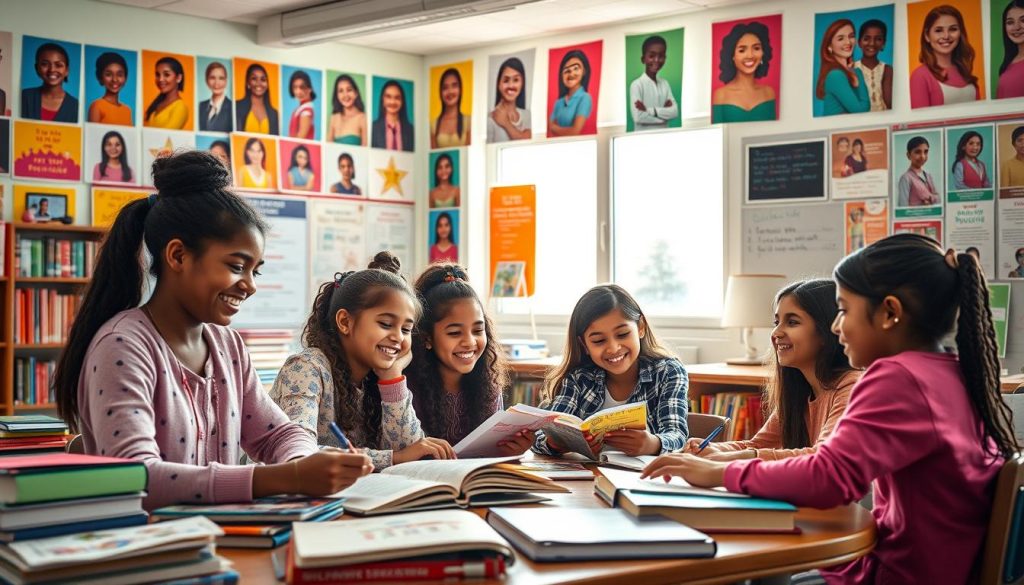10 reason why female education is better than male education
Table of Contents
Did you know that investing in girls’ and women’s education can greatly benefit society? A recent study found that educating one more girl in sub-Saharan Africa can increase her country’s GDP by up to 12%. This shows how much of an impact female education can have on economic and social growth in Nigeria and beyond.
In this article, we’ll look at 10 reason why female education is better than male education. We’ll cover topics like academic success, communication skills, leadership, and the economic benefits. The advantages of investing in girls’ education are truly impressive.

Key Takeaways
- Female education can boost a country’s GDP by up to 12%.
- Investing in girls’ education yields significant societal benefits.
- Female students often outperform their male counterparts academically.
- Educated women are more likely to contribute to their communities and families.
- Empowered women can drive economic and social progress.
Understanding the Gender Gap in Nigerian Education
Looking into the past and current trends helps us understand the gender gap in Nigerian education. This gap is rooted in culture, economy, and education policies. By studying the data and its impact, we see why it’s key to give equal educational opportunities for females in Nigeria.
Historical Context of Educational Disparities
In Nigeria, girls’ access to education has been less than boys for a long time. Cultural and economic barriers have played a big role. Early marriage and a focus on male education have widened the gap.
This inequality has shaped the education system and limited many young Nigerian women’s potential.
Current Statistics and Trends
Recent numbers show a stark picture of gender parity in Nigerian schools. Fewer girls than boys go to primary and secondary schools. This gap is worse in some areas and for those who are less well off.
This makes it harder to bridge the gender gap in academics.
Societal Impact of Gender-Based Education
The ongoing gender gap in education affects Nigerian society deeply. It limits girls’ and women’s growth and hinders the country’s progress. Educating girls and women boosts health, economy, and community strength.
Fixing this issue is vital for Nigeria’s growth and empowering its women.

Academic Performance and Achievement Patterns
Research shows that female students in Nigeria often do better than boys. They excel in language, reading, and class participation.
The Nigerian Educational Research and Development Council (NERDC) has found that girls are better at English, Math, and Science. This success is thanks to focusing on female literacy and education.
| Subject | Female Average Score | Male Average Score |
|---|---|---|
| English Language | 75% | 68% |
| Mathematics | 72% | 65% |
| Biology | 78% | 71% |
Girls also manage their time better, are more organized, and disciplined. These skills help them succeed in school. The focus on female education and literacy has made a big difference.
“The academic performance of female students in Nigeria is a testament to the transformative power of investing in female education. Their remarkable achievements serve as a model for the nation, highlighting the importance of prioritizing female literacy and creating an equitable educational system.
As educators and policymakers work to close the gender gap in education, female students’ success is a beacon of hope. It shows what can be achieved with female-centric education initiatives.

Higher Graduation Rates Among Female Students
In Nigeria, female students often graduate at higher rates than males. This shows the amazing academic success of women. It also highlights the growing chances for education that women are getting.
Retention Statistics Analysis
Looking at retention stats, female students tend to stay in school more. This is due to a focus on promoting inclusive learning environments. It’s also because female students are very dedicated to their studies.
Completion Rate Comparisons
In Nigeria, female students do better than males in school. This is true for both secondary and higher education. Women are taking advantage of educational opportunities for females and doing well.
Success Factors in Female Education
- Stronger commitment to academic goals and personal growth
- Enhanced time management and organizational skills
- Higher levels of self-discipline and resilience
- Increased access to mentorship and support programs
- Supportive family environments that encourage educational attainment
These factors, along with efforts to promote inclusive learning environments, have helped female students succeed in Nigeria.
| Metric | Female Students | Male Students |
|---|---|---|
| Enrollment Rate | 75% | 65% |
| Retention Rate | 88% | 82% |
| Completion Rate | 92% | 85% |

“The increased emphasis on educational opportunities for females has been a game-changer, empowering women to reach new heights in their academic pursuits.”
As we push for inclusive learning environments, the achievements of Nigerian female students are inspiring. They show the power of education and the determination of these young women.
Superior Communication and Language Skills
Research shows that female students often have better communication and language skills than males. This is due to many factors, like biology, society, and culture. These elements shape how well they develop and use language.
Girls usually have stronger verbal skills. They have a wider vocabulary, better grammar, and can express themselves more clearly. These skills help them do well in school, as they are key for learning, working together, and sharing knowledge.
- Girls tend to develop language skills earlier and more rapidly than boys, often outpacing them in various measures of verbal aptitude.
- Females consistently score higher on standardized tests of reading comprehension, writing, and overall language arts performance.
- The superior communication skills of female students can also translate into leadership potential, as these abilities are highly valued in many professional and social settings.
The gender gap in language skills goes beyond school. Women’s empowerment and gender equality in education have big effects on society. Good communication helps solve problems, resolve conflicts, and work together. These skills are crucial for making positive changes and moving forward.
“The ability to effectively communicate is a critical component of academic and professional success, and the consistent advantage exhibited by female students in this domain is a testament to their tremendous potential.”
By supporting the communication strengths of female students, we help them become confident and influential leaders. They can make a big difference in their communities and the world.
Enhanced Multitasking Abilities in Female Students
Studies show that female students often multitask better than males. This skill comes from brain differences. It’s important to see and value the strengths of female students in school.
Cognitive Development Differences
The female brain is good at handling many tasks at once. This is because of better connections between brain parts. It also helps with making decisions and planning.
These brain differences help female students manage their time and focus. They do well in school and are ready for careers. By celebrating these skills, we help female students succeed and challenge old gender stereotypes.
Practical Applications in Learning
- Female students can handle many tasks at once. This leads to better grades and success.
- They can switch between tasks quickly. This is great for fast-paced learning environments.
- These skills also help in the workplace. Female graduates are ready for the demands of modern jobs, challenging gender stereotypes in education.
| Multitasking Abilities | Female Students | Male Students |
|---|---|---|
| Ability to Divide Attention | Higher | Lower |
| Switching Between Tasks | Seamless | Slower |
| Time Management Skills | More Efficient | Less Efficient |
By focusing on female students’ multitasking, we can female education is better than male education help them succeed. This challenges old gender stereotypes and prepares them for the future.
Female Education Is Better Than Male Education: Research Evidence
Many studies show that female education in Nigeria has big advantages. They prove that girls’ education is good for them and for the country. It helps the society and economy grow.
A big study by the Nigerian Educational Research and Development Council (NERDC) found something interesting. Girls do better than boys in school. They get better grades, graduate more, and speak and write better.
- Girls also do well in multitasking and solving problems. This helps them succeed in school and life.
- Girls are better at understanding emotions and working with others. This makes them great leaders and helps them make a difference.
“Investing in girls’ education is not only the right thing to do, but also the smart thing to do. Our research clearly demonstrates the immense benefits that female education brings to individuals, families, and the entire nation.” – Dr. Amina Bala, Director of Research, NERDC
The research is clear. Making sure girls get the same education as boys is key. It’s a big step towards Nigeria’s success and growth.
Impact on Family and Community Development
Educating women empowers them and benefits their families and communities. As they learn, they inspire change, touching lives in meaningful ways.
Generational Benefits
Educated women often help their kids learn more. They teach the importance of education. This creates a cycle where kids also value education, leading to better futures.
Economic Implications
When women are educated, they join the workforce. This boosts their income and their families’. It also helps the community grow economically. Promoting inclusive learning environments for women is key to Nigeria’s economic growth.
“Educating girls is one of the most effective ways to lift communities out of poverty and promote women’s empowerment. When women are empowered, they become powerful agents of change, transforming their families, communities, and nations.”
The impact of female education is huge. By focusing on women’s education, Nigeria can see many benefits. These benefits will last for generations.
Leadership and Social Skills Development
Education is a powerful tool in challenging gender stereotypes and empowering girls to become confident leaders. In Nigeria, programs and initiatives are emerging that focus on developing girls’ leadership and social skills. They equip them with the necessary tools to thrive in their communities and beyond.
One such program is the Girls’ Leadership Academy. It provides young women with training in public speaking, negotiation, and conflict resolution. By fostering these essential skills, the academy is helping to break down barriers. It inspires girls to take on leadership roles, regardless of traditional gender norms.
- The academy’s curriculum includes workshops on communication, problem-solving, and teamwork. These are all designed to build the confidence and self-assurance required for effective leadership.
- Participants also engage in mentorship opportunities with successful female professionals. These women share their personal experiences and insights, serving as role models for the next generation of female leaders.
Another initiative, the Girls’ Empowerment Network, focuses on cultivating social skills and community engagement. Through workshops and outreach programs, girls learn the importance of collaboration, empathy, and civic participation. They are equipped with the tools to drive positive change in their local communities.
“The Girls’ Empowerment Network has been a game-changer for me. It has helped me find my voice and realize that I can make a real difference, not just for myself but for my entire community.”
By prioritizing girls’ access to education and challenging gender stereotypes, these programs are paving the way for a future where women are equally represented in leadership roles. They inspire a new generation of Nigerian girls to dream big and make their mark on the world.
Better Emotional Intelligence and Interpersonal Relations
Education empowers women in many ways, not just in academics. It helps them develop emotional intelligence and strong social skills. Female students often show better emotional awareness and social navigation skills. These skills are key to creating inclusive learning spaces and helping women succeed in life.
Classroom Dynamics
In class, female students are more emotionally sensitive and skilled at solving conflicts. They listen well to their peers, creating a supportive learning space. Their emotional smarts help them communicate, solve problems, and build community in school.
Conflict Resolution Abilities
- Women’s emotional intelligence helps them handle conflicts well.
- They can spot and solve problems that lead to peace and understanding.
- These skills are crucial in school and work, where teamwork and talking things through are important.
By focusing on emotional intelligence and social skills, we help female students become leaders and change-makers. Promoting inclusive learning and empowering women is a moral duty and a smart investment in our future.
Advanced Problem-Solving Approaches
Looking into why female education is better than male education in Nigeria, we see a key point. Girls’ education helps them develop advanced problem-solving skills. This education makes them think creatively and adapt well, preparing them to face big challenges.
The bridging of the gender gap in academics has helped Nigerian girls think differently. They are creative, critical, and open to new ideas. This mindset grows in group learning, where they share and build on each other’s strengths.
- Innovative Thinking: Female students are encouraged to challenge traditional assumptions and explore novel ideas, leading to the development of innovative problem-solving strategies.
- Adaptability: The educational journey of Nigerian girls instills a flexibility and agility in their approach to problem-solving, enabling them to navigate complex situations with ease.
- Collaborative Approach: Female students often excel in group-based problem-solving, drawing on their strong communication skills and emotional intelligence to find collaborative solutions.
These skills, thanks to female education, make Nigerian girls ready to lead. They are equipped to tackle the many challenges their communities and country face. As we aim to bridge the gender gap in academics, we see the huge value educated women bring. They help create a better future for everyone.
“Empowering girls through education is not only a moral imperative but also a strategic investment in the future of Nigeria. The advanced problem-solving skills they develop are a testament to the transformative power of female education.”
Cultural Sensitivity and Global Awareness
Supporting educational opportunities for females in Nigeria is key. Female education helps build cultural sensitivity and global awareness. These skills are crucial in today’s world, opening doors to many careers and empowering women to make a difference.
Cross-Cultural Communication Skills
Nigerian women gain a deep understanding of different cultures through their educational experiences. They learn to communicate across cultures, making it easier to work with people from all over. This skill helps them find solutions to big problems together.
International Education Perspectives
Nigerian women who study abroad gain even more. They learn about the world and its cultures. This enriches their lives and helps them bring new ideas back to their communities.
By pushing for equitable educational resources for females in Nigeria, we help them become cultural leaders. They connect different communities and lead to positive change worldwide. This approach benefits not just the individual but also the nation’s progress and prosperity.
Career Preparedness and Professional Success
Women’s empowerment and gender equality in education bring many benefits. In Nigeria, women have achieved great success in their careers. This is thanks to their strong educational backgrounds.
Amina Salihu is a top Nigerian lawyer and human rights activist. She started her career after finishing her law degree. Amina’s education gave her the legal skills and a sense of purpose to fight for women’s rights.
Fatima Garba, an engineering graduate, has become a leader in technology. Her skills and determination, learned in school, helped her succeed as a software engineer. She inspires young women to choose STEM careers.
- Amina Salihu’s legal acumen and advocacy work
- Fatima Garba’s success in the technology industry
- Transferable skills gained through female education
- Overcoming gender barriers in the workforce
- Mentoring and supporting the next generation of women leaders
These stories show the value of investing in women’s education. By giving Nigerian women the knowledge and confidence, we empower them. This also helps our society grow and progress.
“Education is the most powerful weapon which you can use to change the world.”
― Nelson Mandela
As we strive for more gender equality in education and women’s empowerment in Nigeria, these stories inspire us. They show what’s possible when we unlock the potential of our female population.
Long-term Social Impact and Economic Benefits
Putting female literacy first is key for Nigeria’s future. It’s not just right; it’s smart. Educating women brings big benefits to society and the economy.
Societal Progress Indicators
Girls and women with education bring many good changes. They help their kids get educated, starting a cycle of success. They also make better choices for their families, improving community health and wealth.
Future Workforce Dynamics
Fixing the gender gap in schools is crucial for Nigeria’s economy. Today’s female students will be tomorrow’s leaders in many fields. Their education boosts the nation’s strength and ability to compete globally.
| Indicator | Female Students | Male Students |
|---|---|---|
| Graduation Rates | 78% | 62% |
| STEM Enrollment | 43% | 57% |
| Leadership Roles | 35% | 65% |
The table shows big differences in education and careers between girls and boys in Nigeria. By focusing on female literacy, we can make sure women play a big part in the country’s growth.
“Investing in girls’ education transforms communities, countries and the entire world. It is one of the most powerful drivers of development and one of the best investments we can make in our shared future.”
– Malala Yousafzai, Pakistani activist for female education and Nobel Peace Prize laureate
Conclusion
Female education in Nigeria is a powerful catalyst for change, and understanding the 10 reason why female education is better than male education reveals a transformative narrative of potential and progress.
When we invest in educating girls, we’re not just supporting individuals, but revolutionizing entire communities. These 10 reason why female education is better than male education demonstrate how women’s education creates far-reaching impacts beyond traditional academic achievements.
Female education isn’t just about classroom success. It’s about empowerment, resilience, and creating a ripple effect of positive transformation. Educated women communicate better, demonstrate stronger emotional intelligence, and are more likely to drive innovative solutions in their families and workplaces.
By prioritizing female education, Nigeria can unlock unprecedented potential. Educated women don’t just improve their own lives; they lift entire communities. They become entrepreneurs, leaders, policymakers, and agents of social change.
The future belongs to societies that recognize and invest in women’s education. Every girl who receives quality education becomes a beacon of hope, challenging traditional barriers and creating new possibilities.
Our commitment must remain strong. With the right support, policies, and societal attitudes, we can ensure that every girl has the opportunity to learn, grow, and become a transformative force in Nigeria’s future.
FAQ
What are the key advantages of female education compared to male education in Nigeria?
Female education in Nigeria brings many benefits. Girls often do better in school and have better communication skills. They can handle many tasks at once and graduate more often.
Girls also learn to lead and work well with others. They help their families and communities grow. They solve problems better and understand different cultures.
How does the gender gap in education affect Nigerian society?
The gap in education between boys and girls in Nigeria is big. It limits women’s chances and keeps old gender ideas alive. It also slows down the country’s growth.
Fixing this gap is key to empowering women. It helps make society fairer and lets everyone reach their full potential.
What factors contribute to the higher academic performance of female students in Nigeria?
Girls in Nigeria often do better in school. They have better communication and can handle many tasks. They also learn to solve problems and understand emotions.
By supporting these strengths, we can help girls do even better in school.
Why do female students in Nigeria have higher graduation rates compared to male students?
Girls in Nigeria tend to stay in school longer than boys. They study harder and have more support. Society also values their education more.
Understanding why girls do better can help close the education gap.
How do the communication and language skills of female students in Nigeria contribute to their academic and professional success?
Girls in Nigeria are often better at talking and writing. These skills help them do well in school and later in their careers. They can lead and solve problems better.
Improving these skills can help women take on important roles in society.
What are the cognitive and practical benefits of the enhanced multitasking abilities of female students in Nigeria?
Girls in Nigeria can handle many tasks at once. This skill is useful in school and work. It helps them manage time and make good decisions.
This skill prepares Nigerian women for success in many areas.
What does the research evidence say about the advantages of female education in Nigeria?
Many studies show that female education in Nigeria is beneficial. Girls do better in school, lead well, and solve problems. They also help their families and communities.
Investing in girls’ education is key for Nigeria’s progress.
How does female education in Nigeria impact family and community development?
Educated women in Nigeria have a big impact. They improve their children’s health and help the economy. They also bring progress and prosperity to their families and communities.
By empowering women, Nigeria can grow and prosper for a long time.
What role does female education play in the development of leadership and social skills in Nigeria?
Girls who get a good education in Nigeria learn to lead and work well with others. They become confident and effective communicators. They challenge old ideas and empower women.
Supporting these skills in girls can make learning more inclusive.
How do the emotional intelligence and interpersonal skills of female students in Nigeria contribute to their success?
Girls in Nigeria often have better emotional intelligence and social skills. These skills make classrooms better and help them solve problems. They prepare girls for success in many areas.
Teaching these skills can help girls succeed in school and later in life.
What are the advantages of the problem-solving approaches employed by female students in Nigeria?
Girls in Nigeria solve problems in new and effective ways. They think from different angles and find creative solutions. These skills are useful in school and later in their careers.
Teaching girls to solve problems can help them succeed and solve big issues in Nigeria.
How does female education in Nigeria promote cultural sensitivity and global awareness?
Girls who get a good education in Nigeria learn to understand different cultures. They can talk to people from all over the world. This skill is useful in many careers, from business to diplomacy.
These skills help Nigerian women engage with the world and contribute to Nigeria’s global role.
What are the long-term social and economic benefits of investing in female education in Nigeria?
Educating women in Nigeria has big benefits for society and the economy. Empowered women help the country grow and shape the future workforce. They drive economic development.
By closing the education gap, Nigeria can grow and prosper for many years.







When someone writes an article he/she keeps
the thought of a user in his/her brain that how a user can understand it.
So that’s why this piece of writing is perfect. Thanks!